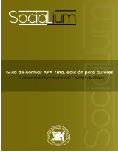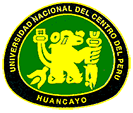Environmental institutionality and management of socio-environmental conflicts in Junín region: Morococha case
DOI:
https://doi.org/10.26490/uncp.sl.2018.2.1.535Keywords:
environmental institutionality, socio-environmental conflictsAbstract
This research’s objective was to determine the relationship between environmental institutionality and socio-environmental conflict management in the Junín region: Morococha case, as well as the relationship between principles of environmental management and conflict demands, the National System of Environmental Management and conflict management, and the relationship between the National System of Evaluation and Environmental Enforcement and citizen participation. It was developed an applied research, at a descriptive-correlational level, with a non-experimental transversal design and a mixed methodological approach. 20 questionnaires were applied to representatives of institutions with competences in socio-environmental conflicts and of associations participating in the Mesa de Diálogo para el Reasentamiento Poblacional de Morococha; the participant observation and the documentary analysis were the techniques used. The results showed that the environmental institutionality in Perú and its implications at the regional and local levels have not allowed an adequate management of the socio-environmental conflict in Morococha, where the Toromocho mining project is being developed, since a correlation of 0.478, rated as a weak positive one, was found. Also, it must be considered that approximately 62.8 % of social conflicts in Peru are of a socio-environmental nature, according to reports from the Defensoría del Pueblo (March 2019) and more than 10 years of conflict management. In conclusion, the strengthening of environmental institutions is needed for an adequate management and prevention of socio-environmental conflicts, especially the practice of transectoriality as a principle of the National Environmental Policy and an adequate National System of Environmental Management.
References
Balvin, L. (2017). Institucionalidad ambiental y gestión de conflictos socio ambientales en la región Junín: caso Morococha (Tesis de maestría). Universidad Nacional del Centro del Perú, Huancayo, Perú.
Blanco, C. (2013). El Proyecto Conga desde los estándares del Sistema Interamericano de Derechos Humanos (Tesis de maestría). Pontificia Universidad Católica del Perú, Lima.
Coser, L. (1970). Nuevos aportes a la teoría del conflicto social. Buenos Aires, Argentina: Amorrortu Editores.
Defensoría del Pueblo. (2019). Reporte de conflictos sociales N.° 181. Recuperado de https://www.defensoria.gob.pe/documentos/reporte-mensual-de-conflictos-sociales-n-181/
Ministerio del Ambiente del Perú. (2010). Política Nacional del Ambiente. Recuperado de http://www.minam.gob.pe/wp-content/uploads/2013/08/Pol%C3%ADtica-Nacional-del-Ambiente.pdf
Programa de las Naciones Unidas para el Desarrollo y Gobierno Regional de Moquegua. (2014). Experiencia de diálogo, transformación de conflictos y construcción de consensos. Sistematización de la Mesa de Diálogo de Moquegua. Recuperado de https://www.undp.org/content/dam/peru/docs/Gobernabilidad%20democr%c3%a1tica/pe.Sistematizacion%20Mesa%20de%20Dialogo%20de%20Moquegua.pdf
Red Muqui. (2016). Balance y propuestas para el funcionamiento de las mesas de diálogo en el Perú. Lima: Tarea Asociación Gráfica Educativa.
Torre, E. (2014). Causas de vulneración de derechos fundamentales por parte de las fuerzas policiales en el conflicto social minero Tintaya Antapacay en el 2012 (Tesis de maestría). Pontificia Universidad Católica del Perú, Lima.
Urcuqui, A. (2011). Conservación y conflictos socioambientales en la cuenca media alta del río Calli (Tesis de maestría). Pontifica Universidad Javeriana, Bogotá, Colombia.








.jpg)















